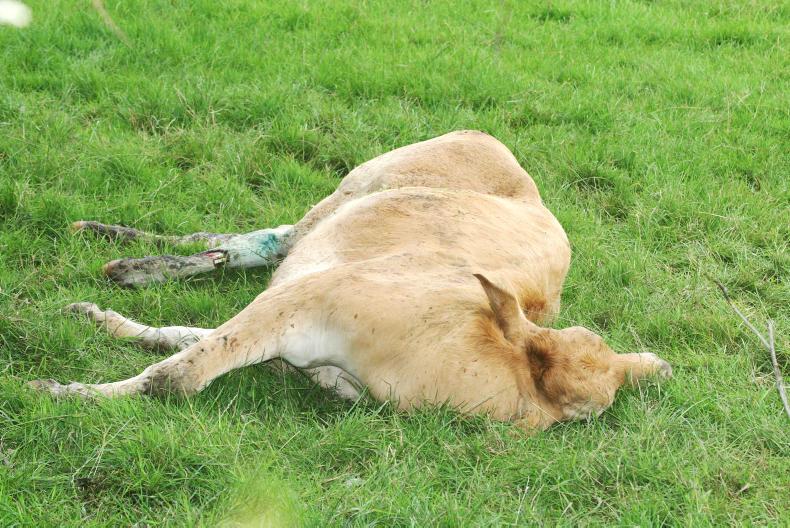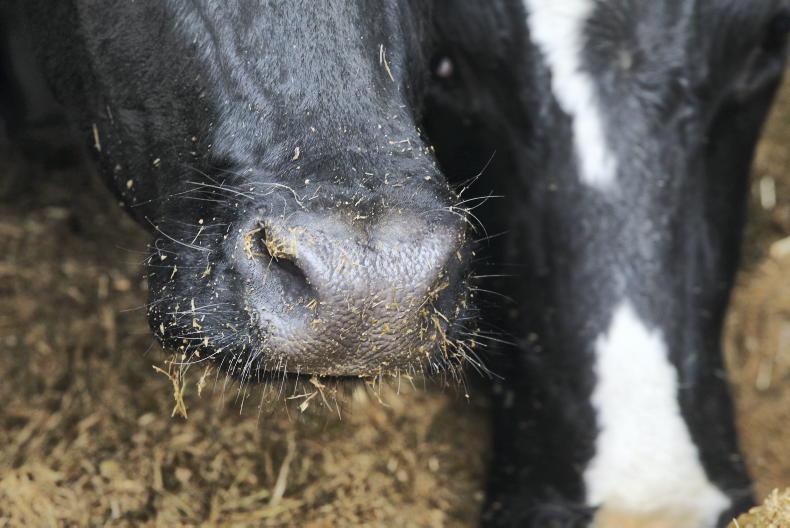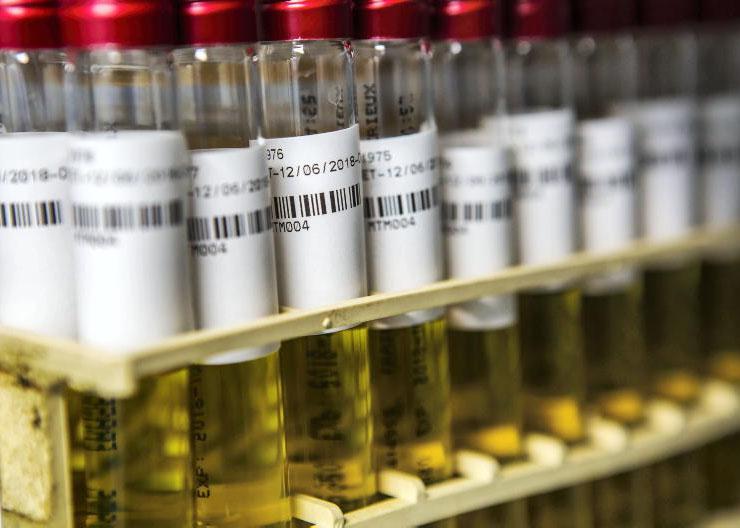The potential devastating impact of a botulism outbreak means that all livestock farmers in NI should consider vaccinating against the disease, a leading private vet has suggested.
“We are going to put it into all our animal health plans from this point forward. The risk posed by botulism is just too high to ignore,” Craig McAlister from Parklands Veterinary Group told the Irish Farmers Journal.
As reported last week, a botulism outbreak in Fermanagh saw a dairy farmer lose over 150 cows in just over one week.
It highlights the significant risk now posed by this disease to cattle (and also sheep) in NI.
In the Fermanagh case, it is understood that the farmer recently opened a silo and only the animals fed this silage were affected.
This suggests that a decaying carcase was picked up in the ensiling process, and during feeding out it was then mixed through the ration offered to cows.
Toxin
Botulism is caused by a very potent toxin produced by the bacterium Clostridium botulinum.
The bacteria will grow to high levels in decaying organic matter, including animal and bird carcases.
In NI, broiler litter contaminated with dead chicken carcases poses a significant risk, although in the Fermanagh outbreak there is nothing to link it to this source.
In simple terms, even a fragment of a dead carcase transferred to pasture by a fox or a crow could be deadly to a grazing animal.
When it gets into silage, there is some evidence to suggest that the normal fermentation process (where pH drops below four) limits the ability of this bacteria to grow.
But in a very dry silage there isn’t the moisture available to enable an acidic fermentation so pH is higher, which could provide suitable conditions for the bacteria to multiply.
“If an animal gets a high dose of the toxin it normally will be dead within 12 hours. In less severe cases it will be initially found staggering about, and if it falls it will be unable to get up.
“It can be quite hard to diagnose, as there are few other clinical signs except that the tongue is not as strong and can be grabbed and pulled out of the mouth,” said McAlister.
At present no vaccine against botulism has a full product licence in Britain or NI, but as an exceptional measure (not allowed in the Republic of Ireland) a vaccine can be imported to NI under special treatment certification.
It is understood that two vaccines are normally imported, one from South Africa and the other from Australia. Botulism is a common problem in both countries, especially during drought conditions. The South African vaccine is the one most commonly used in NI.
It requires two initial shots, one month apart, and a booster shot each year to offer protection. Cost is around £1.67/dose plus VAT. Because it is imported under licence, a vet must keep a record of use.
Given that botulism is not a notifiable disease, there is no compensation available for any animals lost. It also isn’t normally covered as part of farm insurance deals.
“It’s not in the mainstream insurance market. We don’t offer it and I’m not aware of any others,” confirmed Martin Malone from NFU Mutual.
Read more
Devastating botulism outbreak in Fermanagh
Botulism: a deadly disease
The potential devastating impact of a botulism outbreak means that all livestock farmers in NI should consider vaccinating against the disease, a leading private vet has suggested.
“We are going to put it into all our animal health plans from this point forward. The risk posed by botulism is just too high to ignore,” Craig McAlister from Parklands Veterinary Group told the Irish Farmers Journal.
As reported last week, a botulism outbreak in Fermanagh saw a dairy farmer lose over 150 cows in just over one week.
It highlights the significant risk now posed by this disease to cattle (and also sheep) in NI.
In the Fermanagh case, it is understood that the farmer recently opened a silo and only the animals fed this silage were affected.
This suggests that a decaying carcase was picked up in the ensiling process, and during feeding out it was then mixed through the ration offered to cows.
Toxin
Botulism is caused by a very potent toxin produced by the bacterium Clostridium botulinum.
The bacteria will grow to high levels in decaying organic matter, including animal and bird carcases.
In NI, broiler litter contaminated with dead chicken carcases poses a significant risk, although in the Fermanagh outbreak there is nothing to link it to this source.
In simple terms, even a fragment of a dead carcase transferred to pasture by a fox or a crow could be deadly to a grazing animal.
When it gets into silage, there is some evidence to suggest that the normal fermentation process (where pH drops below four) limits the ability of this bacteria to grow.
But in a very dry silage there isn’t the moisture available to enable an acidic fermentation so pH is higher, which could provide suitable conditions for the bacteria to multiply.
“If an animal gets a high dose of the toxin it normally will be dead within 12 hours. In less severe cases it will be initially found staggering about, and if it falls it will be unable to get up.
“It can be quite hard to diagnose, as there are few other clinical signs except that the tongue is not as strong and can be grabbed and pulled out of the mouth,” said McAlister.
At present no vaccine against botulism has a full product licence in Britain or NI, but as an exceptional measure (not allowed in the Republic of Ireland) a vaccine can be imported to NI under special treatment certification.
It is understood that two vaccines are normally imported, one from South Africa and the other from Australia. Botulism is a common problem in both countries, especially during drought conditions. The South African vaccine is the one most commonly used in NI.
It requires two initial shots, one month apart, and a booster shot each year to offer protection. Cost is around £1.67/dose plus VAT. Because it is imported under licence, a vet must keep a record of use.
Given that botulism is not a notifiable disease, there is no compensation available for any animals lost. It also isn’t normally covered as part of farm insurance deals.
“It’s not in the mainstream insurance market. We don’t offer it and I’m not aware of any others,” confirmed Martin Malone from NFU Mutual.
Read more
Devastating botulism outbreak in Fermanagh
Botulism: a deadly disease










SHARING OPTIONS